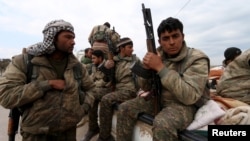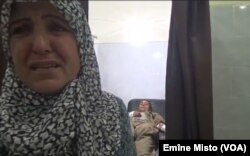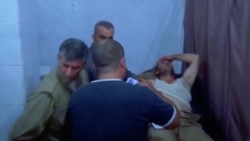Six Syrian Kurdish fighters were killed and a dozen were wounded as Turkish military artillery fired across the border Thursday into Syria, Kurdish officials and rights activists said.
Some of those wounded in the attack on the northern town of Afrin were civilians, according to the Syrian Observatory for Human Rights, a group that has researchers across the country.
"Two members of our security forces were killed by Turkish snipers before their artillery attacked us," Ahmed Ali, a wounded Kurdish fighter, told VOA.
Another Kurdish fighter said he came under a Turkish mortar attack while he was trying to retrieve the body of a fellow fighter.
Afrin is controlled by the Kurdish People's Protection Units, known as YPG, that are allied with the United States in the fight against Islamic State in Syria. Turkey views the YPG as a terror group linked to the Turkey-based Kurdistan Workers' Party (PKK).
Turkish military sources said the Afrin incident began when border guards came under machine-gun fire from unknown forces inside Syria. Turkey's Dogan News Agency reported that Turkish military responded to "harassment fire in accordance with rules of engagement." Turkey fears that a strong Kurdish entity in Syria would aid and embolden PKK fighters who have been fighting against the Turkish military for decades.
Tensions between Turkey and Syrian Kurds have increased since Turkish-backed Syrian rebels not affiliated with the YPG entered the border town of Jarablus in late August, pushing back IS fighters and preventing further expansion of the U.S.-backed militias.
WATCH: Wounded Kurdish Fighter Talks about Attack
The United States has repeatedly called on both sides to exercise restraint and focus more on fighting IS militants.
"We have agreed with them about where each party will be, geographically, in such a way that they can conduct their operations against [Islamic State] and not run into each other," U.S. Defense Secretary Ash Carter said in a recent interview with CNN. Otherwise, he added, there could be a "collision between the two [sides] … which we don't want to see."
VOA's Uzay Bulut contributed to this report from Washington.







